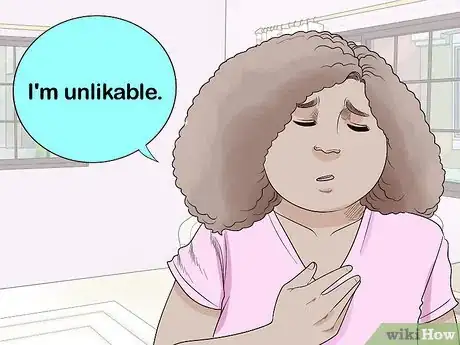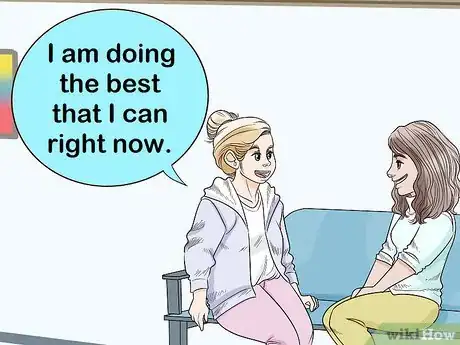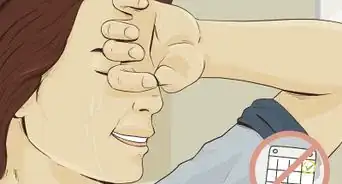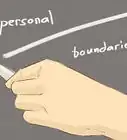This article was co-authored by George Sachs, PsyD. George Sachs is a Licensed Psychologist and the Owner of Sachs Center based in New York, New York. With over ten years of experience, Dr. Sachs specializes in treating ADD/ADHD and Autism Spectrum Disorders in children, teens, and adults. He holds a BS in Psychology from Emory University. Dr. Sachs earned his Doctorate of Psychology (PsyD) from the Illinois School of Professional Psychology, Chicago. He completed his clinical training in Chicago at Cook County Hospital, Mt. Sinai Hospital, and the Child Study Center. Dr. Sachs completed his internship and postdoctoral work at the Children’s Institute in Los Angeles, where he supervised and trained therapists in Trauma-Focused Cognitive Behavioral Therapy (TFCBT). He has been trained as a Gestalt Therapist and certified by the Gestalt Associates Training Program of Los Angeles. Dr. Sachs is the author of The Adult ADD Solution, Helping the Traumatized Child, and Helping Your Husband with Adult ADD. He has appeared on the Huffington Post, NBC Nightly News, CBS, and WPIX discussing his holistic approach to ADD/ADHD treatment.
There are 8 references cited in this article, which can be found at the bottom of the page.
This article has been viewed 40,809 times.
Overcoming your shame will not be a linear process. You may have to go through the steps in this wikiHow again and again to get a handle on your shame. It all starts with practicing forgiveness and allowing yourself to be human. Shame makes you feel unworthy, so counter that with confidence-boosting practices. After that, cultivate self-love and compassion so that you are better equipped to deal with shame in the future.
Steps
Forgiving Yourself
-
1Acknowledge how shame is holding you back. Shame is a strong emotion that can convince you that you are flawed and unworthy. It shuts you down, inhibits you, and separates you from others. Recognize the story you've been telling yourself, so that you can figure out how to change it.[1]
- Spot what you have been narrating about yourself, your abilities, or your life. Your shame story probably pops up whenever you feel down about yourself.
- For example, when you fail to connect with others, you might tell yourself “I'm unlikable” or “People find me boring.”
- Shame might stem from difficulty in your personal history, such as poverty or domestic abuse.
-
2Sit with your emotions without pushing them away. A part of dealing with shame involves letting yourself feel the emotions underlying it. Name the emotion beneath your pain and sit with it.[2]
- For instance, maybe you feel humiliated about your divorce. Because you wouldn't acknowledge the humiliation, shame crept in.
- Say something like, “I feel humiliated about my divorce. I think everyone sees me as damaged goods.” Afterwards, sit with that feeling without trying to push it away.
- Consider journaling about what you feel when you feel shame. Whether it's a person or other feelings you normally keep buried, it is important to acknowledge them to yourself.
Advertisement -
3Forgive yourself for being human. Shame causes you to judge yourself harshly for something you did. However, when you acknowledge that any mistake you have made was human and that many others have also made the same mistake, the shame is reduced.[3]
- Repeat aloud, “I am only human. I forgive myself for making a human mistake.”
-
4Share your story if you want to. Shame tends to isolate you from others. The more you play into it, the more you withdraw. Counter by opening up and showing your vulnerability to someone you trust.[4]
- Tell your shame story to someone close to you. You will likely find that telling your story frees you from the feeling of shame.
- If you don't feel comfortable sharing your story, consider journaling or blogging about it. You don't have to publish your story or share it with anyone else, but this process does help you get everything out.
- Often, secrecy makes shame worse.
Seeing Your Worth
-
1Develop a “good things” list for when you need to be reminded of your worthiness. You can overcome shame by injecting a much-needed confidence boost.[5]
- Write out a long list of your best traits and accomplishments. You might list things like “great listener” or “fast learner.”
- Review this list whenever you feel unworthy.
-
2Try something new to build self-esteem. Shame can keep you trapped in your comfort zone. Taking a risk and challenging yourself in a new way can help you break out of that pattern. This can be something really big or minor—it's up to you.
- Sign up for a foreign language course, go back to school, pick up a hobby, or join a club or organization.
- Small challenges could be speaking to a stranger or reading a book from a new genre.
-
3Help someone to feel useful. Shame ensures that you focus on yourself, but you can overcome it by focusing on others. Dedicate your time to volunteerism, donate to charity, or simply lend a hand to a neighbor or friend in need.[6]
-
4Set a small, actionable goal to work towards. Think about some part of your life in which you'd like to advance and set a small goal. Break it down into several steps and take action towards it daily. Reaching a goal--no matter how minor--could help you combat the shame you feel.[7]
- For example, maybe you've been wanting to lose weight, but it feels overwhelming. Set a small goal, like drinking more water or eating more vegetables. Changing just one small thing can help you get closer to where you want to be.
Practicing Self-Love
-
1Start a mindfulness practice. Commit to sitting in silence for at least 10 minutes daily. Focus completely on breathing deeply. If your mind wanders, return your focus to your breath.[8]
- Mindfulness helps you gain awareness about the thoughts and feelings you experience. It also helps keep you in the present moment, which is useful if you're dwelling on the past.
-
2Speak to yourself like you would a friend. Battle shame by changing the narration in your head that you've been telling yourself all along. Instead of harsh judgments or criticism, reframe your internal script to loving, compassionate statements.[9]
- For example, rather than saying “I can never do anything right,” say “I am doing the best that I can right now.”
-
3Build a supportive social circle. The people you spend time with can actually reinforce shameful feelings and beliefs, particularly if they are narrow-minded or judgmental. Make an effort to form relationships with people who are positive and supportive.[10]
- Review your social connections. Start spending more time with the people who make you feel good about yourself and less time with the people who don't. Hanging out with negative people will not be helping your cause. Although it may be hard to part ways, this is for your overall entertainment.
- You could also join a support group. This is a safe space where you can share your shame with other people who are not dependent on you for anything.[11]
-
4Accept that you may go in and out of episodes of shame. The process of overcoming shame is not a straight line. You may backtrack several times before getting control. Even then, certain situations may cause shame to rear its ugly head. Be patient with yourself and repeat the steps as needed.[12]
Expert Q&A
-
QuestionHow can I overcome the shame of rejection?
 George Sachs, PsyDGeorge Sachs is a Licensed Psychologist and the Owner of Sachs Center based in New York, New York. With over ten years of experience, Dr. Sachs specializes in treating ADD/ADHD and Autism Spectrum Disorders in children, teens, and adults. He holds a BS in Psychology from Emory University. Dr. Sachs earned his Doctorate of Psychology (PsyD) from the Illinois School of Professional Psychology, Chicago. He completed his clinical training in Chicago at Cook County Hospital, Mt. Sinai Hospital, and the Child Study Center. Dr. Sachs completed his internship and postdoctoral work at the Children’s Institute in Los Angeles, where he supervised and trained therapists in Trauma-Focused Cognitive Behavioral Therapy (TFCBT). He has been trained as a Gestalt Therapist and certified by the Gestalt Associates Training Program of Los Angeles. Dr. Sachs is the author of The Adult ADD Solution, Helping the Traumatized Child, and Helping Your Husband with Adult ADD. He has appeared on the Huffington Post, NBC Nightly News, CBS, and WPIX discussing his holistic approach to ADD/ADHD treatment.
George Sachs, PsyDGeorge Sachs is a Licensed Psychologist and the Owner of Sachs Center based in New York, New York. With over ten years of experience, Dr. Sachs specializes in treating ADD/ADHD and Autism Spectrum Disorders in children, teens, and adults. He holds a BS in Psychology from Emory University. Dr. Sachs earned his Doctorate of Psychology (PsyD) from the Illinois School of Professional Psychology, Chicago. He completed his clinical training in Chicago at Cook County Hospital, Mt. Sinai Hospital, and the Child Study Center. Dr. Sachs completed his internship and postdoctoral work at the Children’s Institute in Los Angeles, where he supervised and trained therapists in Trauma-Focused Cognitive Behavioral Therapy (TFCBT). He has been trained as a Gestalt Therapist and certified by the Gestalt Associates Training Program of Los Angeles. Dr. Sachs is the author of The Adult ADD Solution, Helping the Traumatized Child, and Helping Your Husband with Adult ADD. He has appeared on the Huffington Post, NBC Nightly News, CBS, and WPIX discussing his holistic approach to ADD/ADHD treatment.
Licensed Psychologist It's very important to learn to see your shame as almost a hallucination. When you have trouble dealing with your shame, try to catch yourself and say, "This is all in my head. This is just a delusion." It's similar to hearing noises in your home at night, and reminding yourself that there's nobody there.
It's very important to learn to see your shame as almost a hallucination. When you have trouble dealing with your shame, try to catch yourself and say, "This is all in my head. This is just a delusion." It's similar to hearing noises in your home at night, and reminding yourself that there's nobody there.
References
- ↑ https://tinybuddha.com/blog/overcoming-shame-forgive-let-go/
- ↑ https://www.huffingtonpost.com/margaret-paul-phd/dealing-with-shame_b_994991.html
- ↑ https://tinybuddha.com/blog/overcoming-shame-forgive-let-go/
- ↑ https://healthypsych.com/you-are-worthy-overcome-shame/
- ↑ https://www.psychologytoday.com/blog/overcoming-destructive-anger/201704/overcoming-the-paralysis-toxic-shame
- ↑ https://healthypsych.com/you-are-worthy-overcome-shame/
- ↑ https://www.mindtools.com/selfconf.html
- ↑ https://www.psychologytoday.com/blog/overcoming-destructive-anger/201704/overcoming-the-paralysis-toxic-shame
- ↑ https://liveboldandbloom.com/06/self-confidence/8-strategies-for-overcoming-shame
- ↑ https://www.ncbi.nlm.nih.gov/pmc/articles/PMC2921311/
- ↑ George Sachs, PsyD. Licensed Psychologist. Expert Interview. 5 March 2021.
- ↑ https://tinybuddha.com/blog/overcoming-shame-forgive-let-go/









































































